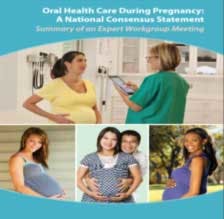Oral health care during pregnancy
Tips for Good Oral Health during Pregnancy is excerpted from the consensus statement. It is a two-page handout for pregnant women (online only).(4)
Educating pregnant women about preventing and treating dental caries is critical. Evidence suggests that most infants and young children acquire caries-causing bacteria from their mothers. Providing pregnant women with counseling to promote healthy oral health behaviors may reduce transmission of such bacteria from mothers to infants and young children, thereby delaying or preventing the onset of caries.
Several states developed guidelines for oral health care during pregnancy. New York (2006); South Carolina (2009); Washington (2009); and California (2010). Educational resources were created for health professionals and pregnant women. As well, many national organizations have issued statements and recommendations created to improve oral health care during pregnancy, such as the American Academy of Pediatric Dentistry.
Oral health professionals can advise pregnant women about oral health care by reassuring them that oral health care, including radiographs, pain medication, and local anesthesia, is safe during pregnancy and encouraging them to seek oral health care, practice good oral hygiene, eat healthy foods, and attend prenatal classes during pregnancy.
References
1. http://well.blogs.nytimes.com/2013/05/06/obstacles-for-pregnant-women-seeking-dental-care/.
2. http://www.mchoralhealth.org/materials/consensus_statement.html.
3. http://www.mchoralhealth.org/PDFs/OralHealthPregnancyConsensus.pdf.
4. http://www.mchoralhealth.org/PDFs/OralHealthPregnancyHandout.pdf.
http://www.mchoralhealth.org



